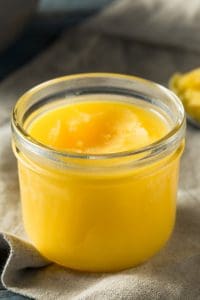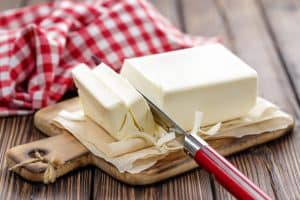Butter or Ghee: Which one is better?
The question of butter or ghee is quite a conundrum. Ghee is all the rave. Whether you are trying to lose weight or not, you can find lots of claims to the benefits of ghee with a quick internet search. I have read articles claiming that ghee can help you lose weight, lower your risk of heart disease, have more beautiful babies, it is more nutritious, and it can help your mental health. The purpose of this article is to discuss ghee and the myths and facts surrounding its use.
What is ghee?
Anyone who has tried to make movie theater popcorn at home without a microwave may unknowingly have made ghee. Most recipes to make movie theater popcorn at home call for clarified butter. Ghee is nothing more than a form of clarified butter. In fact, it is not a new thing and it has been used for thousands of years in cooking. You may find it in Indian recipes such as a curry.
The clarification process is simple. In fact, I have done it for years to make ghee for popcorn. Ghee is made by melting regular cow’s milk butter. The butter separates into liquid fats and milk protein solids. Once the butter separates, the milk solids or protein and some lactose are removed by skimming off the top.
The difference between butter and ghee:
- Ghee has a higher smoke point. Butter can smoke and burn at 350°F. Ghee can withstand heat up to 485°F.
- Ghee contains fewer milk proteins than butter. Ghee production separates the water-soluble parts (protein and lactose) from fat.
- Ghee is higher in fat and calories. With the water removed, ghee is a more concentrated source of fat. Tablespoon per tablespoon, ghee has about 20 calories more than butter.
Can I buy ghee?
If you have never purchased ghee, you will be prised to find that it is available in your local grocery store. If you look in your local grocery store in the health food aisle, you will find ghee in multiple forms. Just like butter, my local grocery store has organic, grass-fed, and regular ghee. I have tried all of them and have never found much of a difference between them.
What are the health benefits of ghee?
Before you call foul. Many of the below benefits are tied to both butter and ghee.
- Ghee may have less lactose than butter. When the water-soluble protein separate, it removed some lactose with it. The skimming may remove enough lactose to allow you to better tolerate butter. Because ghee has had some of the dairy proteins and lactose removed, it contains fewer dairy proteins and lactose than regular butter. A person who is sensitive or intolerant to lactose and dairy protein such as casein may find ghee a potential substitute for butter.
It is worth a try but, keep in mind that this concept is for lactose intolerance and not a true allergy. If you think you may have an allergy, discuss your symptoms with a medical provider. True allergies are life-threatening. - Ghee has a higher smoke point than butter. The smoke point of an oil is the temperature at which it begins to burn and smoke. Oils like olive oil tend to smoke and burn at a lower temperature. This increases the risk of hitting its flash point and causing a fire, and the burning or smoking increases harmful free radicals that are carcinogenic. Ghee is a superior cooking oil because of its high smoke point. The best part of ghee is that it retains the nutty, buttery flavor we all love from butter.
- Ghee is nutritious. Ghee is high in fat-soluble vitamins. A few servings of ghee to your diet each day will add some much needed fat-soluble vitamins. Ghee and butter are high in vitamin A, vitamin D, vitamin E, vitamin K, and beta-carotene. Vitamin A has been tied to improved vision and cancer prevention, vitamin E will keep your skin healthy, and vitamin K is important in proper blood clotting.
- Ghee contains high levels conjugated linoleic acid. Conjugated linoleic acid (CLA) is a fatty acid that has been associated with health benefits. Some studies have reported that CLA may be effective in reducing body fat, preventing cancer formation, reducing inflammation, and lowering blood pressure. CLA is not unique to glee. CLA is also found in butter but is found in higher levels in grass-fed butter and ghee.
- Ghee does not require refrigeration. By removing the water-soluble proteins and sugars, ghee is more shelf stable. Ghee will not spoil as readily as milk and butter. You are less likely to open the jar and find a rancid mess.
- Ghee may help with weight loss. Like coconut oil, ghee is high in medium chain fatty acids which have been shown to potentially help with weight loss. CLA, as found in ghee, is found to be helpful in modifying the body composition by reducing body fat.
- Ghee may lower heart risk. CLA has been linked to a lower coronary artery disease risk.
- Ghee intake associated with lower diabetes risk. Ghee has a positive impact on glycemic control. This outcome is likely tied to a lower sugar and carbohydrate intake.
- Ghee may reduce inflammation and boost your immune system. Ghee is high in butyrate. Butyric acid is perhaps the most important element in ghee, has also been linked to the stimulation of T-cell production and CLA has been tied to a lower level of oxidants and inflammation. It is especially tied to lower gastrointestinal inflammation. Ghee may supercharge your immune system.
The myths of ghee:
- Ghee is hypoallergenic. This statement is completely false. If you have a true allergy to milk proteins, it takes very little milk protein to cause a reaction. Milk allergies are not intolerances. Milk allergies are life-threatening reactions that result from an immune reaction to the proteins in milk. Although ghee is virtually protein free, it has some and milk allergic folks should still avoid it.
- Ghee increase risk of heart disease. This theory is based on a single study. Ghee is considered unhealthy for your heart by many people because it is high in saturated fats. The fact is that ghee is high CLA and fat-soluble vitamins such as A, E, and D which can potentially be used in the prevention of cardiovascular diseases.
The bottom line: Ghee is just another form of butter. The fat content of the two is similar, but ghee has less lactose and casein. Therefore, ghee may be a better choice for people who are sensitive to lactose or casein. Ghee is better for cooking because you can heat it to such high temperatures while adding the buttery flavor we all love. If you are concerned about fat intake or saturated fat, it doesn’t matter whether you choose ghee or butter. Their nutritional profiles are almost identical.











Be the first to comment on "The Butter Ghee Conundrum"